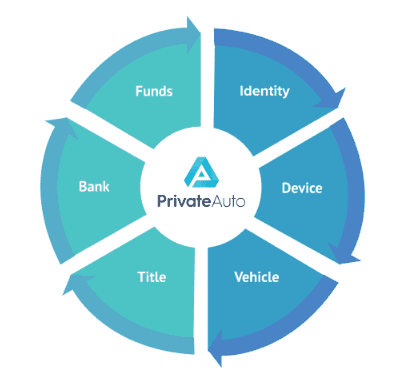How Our DMV Title Check Works
1. Enter any car's vehicle identification number (VIN)
2. Pay a small fee (varies by state)
3. Instant verification of key details about the title and its status
4. Buy the car with peace of mind.
2. Pay a small fee (varies by state)
3. Instant verification of key details about the title and its status
4. Buy the car with peace of mind.
Why Check a Car’s Title Before I Buy It?
A car is a big purchase. When buying a private-party vehicle, it pays to go the extra mile to avoid being saddled with a problem. Plus, we make it so easy and affordable.
•
Make sure the seller legally owns the vehicle
•
Find out if the car has been severely damaged and rebuilt
•
Rule out loans or financial claims against the vehicle
•
Check if the vehicle has ever been reported stolen
You don’t want to wind up with a salvage title vehicle when you thought you were getting a clean title. You definitely don’t want to own a stolen vehicle. And it’s no fun to go through the purchase process, only to find out the vehicle has a lien that was undisclosed by the owner.
Our low-cost DMV title check helps you avoid all these major issues and buy a car with a clear certificate of title.
Our low-cost DMV title check helps you avoid all these major issues and buy a car with a clear certificate of title.
What Info is Included in PrivateAuto’s Title Check?
Our DMV title check reveals different info to sellers and buyers.
For Buyers
For buyers, PrivateAuto’s title check reveals the following info about a motor vehicle’s title:
1. Whether or not the state records of ownership match the seller’s PrivateAuto profile name. If there’s a discrepancy, you’ll see an orange flag that the names don’t match.
2. Whether or not state records include a vehicle co-owner. If there’s a co-owner, most states will require that both owners sign over the title.
3. Whether or not the car is registered in the same state as its PrivateAuto listing claims.
4. Whether or not the vehicle’s VIN is valid. If you’re looking at a stolen vehicle, it will be flagged.
5. Whether or not the car’s year, make, and model match what its PrivateAuto listing claims.
6. Whether or not the vehicle has an active lien (loan) on it.
7. Whether the title is a clean title or branded title.
The info is anonymized to protect the seller’s privacy, but you get solid proof that you’re in the clear. A quick VIN check can save you a lot of expense and headache. Most cars are fine—but you don’t want to be saddled with one that isn’t.
1. Whether or not the state records of ownership match the seller’s PrivateAuto profile name. If there’s a discrepancy, you’ll see an orange flag that the names don’t match.
2. Whether or not state records include a vehicle co-owner. If there’s a co-owner, most states will require that both owners sign over the title.
3. Whether or not the car is registered in the same state as its PrivateAuto listing claims.
4. Whether or not the vehicle’s VIN is valid. If you’re looking at a stolen vehicle, it will be flagged.
5. Whether or not the car’s year, make, and model match what its PrivateAuto listing claims.
6. Whether or not the vehicle has an active lien (loan) on it.
7. Whether the title is a clean title or branded title.
The info is anonymized to protect the seller’s privacy, but you get solid proof that you’re in the clear. A quick VIN check can save you a lot of expense and headache. Most cars are fine—but you don’t want to be saddled with one that isn’t.
For Sellers
If you’re a seller, you can run a quick title check on your car to verify that you’re in the clear. You’ll see the following:
1. The name, address, city, and state of the legal owner (you) in DMV records.
8. Whether or not you have a co-owner in the state records.
9. Your car’s year, make, and model as contained in state records.
10. Your VIN.
11. Whether your car has a lien, and the lienholder if it does have one
12. Whether or not the vehicle has an active lien (loan) on it.
13. The status of your car’s title (clean or branded).
When you do a title check on your own car, your listing will get a badge that may increase your credibility with sellers by demonstrating your commitment to transparency.
1. The name, address, city, and state of the legal owner (you) in DMV records.
8. Whether or not you have a co-owner in the state records.
9. Your car’s year, make, and model as contained in state records.
10. Your VIN.
11. Whether your car has a lien, and the lienholder if it does have one
12. Whether or not the vehicle has an active lien (loan) on it.
13. The status of your car’s title (clean or branded).
When you do a title check on your own car, your listing will get a badge that may increase your credibility with sellers by demonstrating your commitment to transparency.
How Much Does a Vehicle Title Check Cost?
PrivateAuto charges a nominal fee to run a VIN check on a certificate of title. The cost varies by state but averages around $25.
Can’t I Just Check a Title at the DMV?
As a potential buyer, you can’t check a title at your state DMV. State agencies (such as the DMV) have strict privacy parameters and won’t disclose details about vehicle ownership and title status.
The PrivateAuto title check service verifies key details about the vehicle’s title and ownership while maintaining the vehicle owner's privacy.
The PrivateAuto title check service verifies key details about the vehicle’s title and ownership while maintaining the vehicle owner's privacy.
How PrivateAuto Keeps You Safe
PrivateAuto is revolutionizing the private-party vehicle market. With PrivateAuto Pay offering fee-free, instant transfers of any amount, and a ton of third-party integrations, we’re the world’s only transactional automotive marketplace, with tools for every stage of the deal.
Behind the scenes is a set of robust security measures that cross-reference details from many official sources to give scammers nowhere to hide.
Behind the scenes is a set of robust security measures that cross-reference details from many official sources to give scammers nowhere to hide.
In addition to matching DMV records to a seller’s profile and car listing, we cross-reference phone details, banking info, and other mechanisms. It’s all part of our commitment to a totally safe, user-friendly, and secure marketplace.
Car Title FAQ
What types of title fraud are there?
Unfortunately, criminals and scammers employ a range of tactics to deceive you about a vehicle’s title history and status. Here are some of the schemes they employ.
1. Forgery: creating counterfeit titles or forging signatures on genuine documents to illegally transfer vehicle ownership.
2. Title washing: altering documents to conceal salvage history or exploiting lax regulations in certain states to hide a vehicle's troubled past.
3. Title jumping: buying and selling vehicles without proper registration to evade taxes and fees, often practiced by unlicensed dealers.
4. VIN manipulation: altering, switching, or cloning vehicle identification numbers to disguise stolen cars or hide a vehicle's history.
5. Salvage title concealment: removing or obscuring notations that indicate a vehicle is salvaged or a lemon.
6. Lien fraud: falsifying documents to hide existing liens, potentially burdening new buyers with outstanding debts.
7. Fabricating titles: creating fake titles using pieces of legitimate documents or online templates.
Don’t fall prey to title fraud. Use our title check to make an informed decision and stay out of trouble.
1. Forgery: creating counterfeit titles or forging signatures on genuine documents to illegally transfer vehicle ownership.
2. Title washing: altering documents to conceal salvage history or exploiting lax regulations in certain states to hide a vehicle's troubled past.
3. Title jumping: buying and selling vehicles without proper registration to evade taxes and fees, often practiced by unlicensed dealers.
4. VIN manipulation: altering, switching, or cloning vehicle identification numbers to disguise stolen cars or hide a vehicle's history.
5. Salvage title concealment: removing or obscuring notations that indicate a vehicle is salvaged or a lemon.
6. Lien fraud: falsifying documents to hide existing liens, potentially burdening new buyers with outstanding debts.
7. Fabricating titles: creating fake titles using pieces of legitimate documents or online templates.
Don’t fall prey to title fraud. Use our title check to make an informed decision and stay out of trouble.



